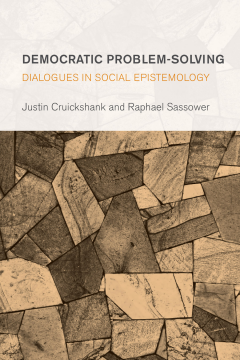
Additional Information
Book Details
Abstract
To what extent is neoliberalism undermining democracy and distorting the values of science? Can and should science be treated as an exemplar for a more dialogic democracy? Are universities and public intellectuals able to develop a more dialogically engaged public? What role should there be for ‘experts’ in a more dialogic democracy? Does information and communications technology present a potential to enhance democracy or increase the control and manipulation of knowledge and the public by corporations?
This timely volume explores these pressing questions, in a dialogue based on developing and applying the recovery of the ‘critical Popper’, which highlights his contemporary relevance to the critique of neoliberal political economy in the age of technocapitalism.
This book will be discussed in an online roundable on the Social Epistemology Review and Reply Collective. Information about the SERRC can be found here: https://social-epistemology.com/
This extremely impressive book spins off from a judicious re-evaluation of surprising parallels between Popper and Rorty to a wide-ranging discussion of the politics of knowledge, and politics more generally, in modern societies. This transatlantic exchange is inevitably what Cruickshank calls a 'slow dialogue', but it is a very worthwhile one, as the UK and US slide towards their respective catastrophes.
William Outhwaite, Emeritus Professor of Sociology, Newcastle University
“This is a superb book. It is both a philosophical examination of the idea of plural epistemological communities and a practical exemplification of the virtue of understanding democracy as an open conversation. Written in the context of a rise in populism, it shows that a hopeful and temperate approach to issues that divide our political communities is possible.”
John Holmwood, Professor of Sociology, University of Nottingham
This book is composed as an experiment on the function of intellectuals in a testing time, the crisis of neo-liberal democracies. Established scholars have teamed up with rising stars in a series of exchanges designed to determine whether the critical spirit of intellectual life is better served by a singular individual who represents diversity in his or her person or by a self-organizing collective forging its way toward some normative ideal. As Cruickshank, Sassower and their collaborators admit, both options may be needed to swim against the ever changing currents of capitalism.
Steve Fuller, Auguste Comte Chair in Social Epistemology, University of Warwick, author of The Intellectual
Justin Cruickshank, Raphael Sassower, and their other interlocutors probe incisively the dialogic bases of beliefs and their relation to political practice. They debate Popper, Rorty, other important theorists and epistemology more broadly via discussion of pressing political and policy issues that illuminate the mounting crises of neoliberalism and need to rethink capitalism and democracy, as we currently know them.
Robert J. Antonio, University of Kansas
Justin Cruickshank is Senior Lecturer in Sociology at the University of Birmingham. He is the author of Realism and Sociology (2002) and editor of Critical Realism: The Difference it Makes (2003).
Raphael Sassower is Professor of Philosophy at the University of Colorado at Colorado Springs. He is the author or co-author of twenty books, including Compromising the Ideals of Science (2015), The Price of Public Intellectuals (2014), Religion and Sports in American Culture (2014), and Digital Exposure: Postmodern Postcapitalism (2013).
Table of Contents
| Section Title | Page | Action | Price |
|---|---|---|---|
| Democratic Problem-Solving | Cover | ||
| Contents | v | ||
| Acknowledgements | ix | ||
| Introduction | xi | ||
| Part 1: Linking Philosophy and Politics | 1 | ||
| 1 Anti-Authority: Comparing Popper and Rorty on the Dialogic Development of Beliefs and Practices | 3 | ||
| 2 A Bridge over Turbulent Waters | 27 | ||
| 3 Context and Contestation | 35 | ||
| 4 Problem-Solving: Critical Contingencies | 47 | ||
| 5 There Are No Dangerous Ideas | 57 | ||
| Part 2: Science, Problem-Solving and Sociology | 67 | ||
| 6 Science, Democracy and the Sociology of Power | 69 | ||
| 7 Criticism versus Dogmatism | 81 | ||
| 8 The Problem of Demarcation Isn’t Going Away | 91 | ||
| Part 3: Democracy, Education and the Role of Intellectuals in Public Life | 105 | ||
| 9 Democracy, Criticism and the Problems Facing Dialogue | 107 | ||
| 10 Beyond Lamentations: Overcoming Neoliberalism? | 121 | ||
| 11 The Politics of Definitions and Neoliberal Interventionism | 129 | ||
| 12 Appealing to Academics to Become Public Intellectuals | 147 | ||
| 13 The Cost of Public Intellectuals | 153 | ||
| 14 Radical Public Intellectuals | 165 | ||
| Part 4: From Public Intellectuals to Political Economy and Technology | 175 | ||
| 15 Public Intellectuals and the Political Economy of Food | 177 | ||
| 16 Desiderata of the Future of Political Economy | 181 | ||
| 17 The Neoliberal Political Economy of Science and Higher Education | 205 | ||
| 18 The Problem of Technocapitalism | 223 | ||
| Part 5: Democracy, Dialogue, Experts and Elites | 231 | ||
| 19 Envisioning Peaceful Democratic Dialogues | 233 | ||
| 20 Democracy, Experts and Elites: The Case of Brexit | 251 | ||
| Conclusion | 265 | ||
| Bibliography | 267 | ||
| Index | 293 | ||
| About the Authors | 299 |
